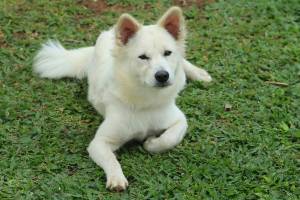
Constipation in dogs is a common issue that can be caused by various factors, including dehydration, inadequate fiber in their diet, lack of exercise, or even certain medical conditions. If your dog is constipated, they may show signs of discomfort, such as straining during bowel movements, producing dry or hard stools, or having a decreased frequency of defecation. It’s important to pay attention to these signs and take proactive steps to provide relief for your beloved pet.
Before trying any remedies, it’s crucial to consult your veterinarian to rule out any underlying health issues that may be contributing to your dog’s constipation. Your vet can provide a thorough examination and offer personalized advice based on your dog’s specific needs. Additionally, they can determine if there are any serious health concerns that require immediate attention. It’s always best to seek professional guidance to ensure the well-being of your dog.
One of the primary steps in managing your dog’s constipation is to ensure they have access to an adequate amount of fresh water. Dehydration can contribute to the development of constipation, so making sure your dog stays well-hydrated is essential. Encourage your dog to drink water regularly, and consider adding wet food to their diet to increase their moisture intake. Adequate hydration can help soften their stools and make it easier for them to pass.
Diet plays a significant role in your dog’s digestive health. If your dog is experiencing constipation, consider adjusting their diet to include more fiber. High-fiber foods, such as canned pumpkin, steamed sweet potatoes, or green beans, can aid in promoting regular bowel movements. However, it’s important to introduce dietary changes gradually to prevent digestive upset. Consult with your vet to determine the appropriate dietary adjustments for your dog’s specific needs.
Regular exercise is crucial for maintaining your dog’s overall health, including their digestive system. Physical activity can help stimulate bowel movements and prevent constipation. Take your dog for daily walks, play interactive games, or engage in other forms of physical activity that your dog enjoys. Exercise not only promotes regular bowel movements but also contributes to your dog’s mental and emotional well-being.
In some cases, your veterinarian may recommend the use of laxatives or stool softeners to help alleviate your dog’s constipation. However, it’s important to use these products only under the guidance of a veterinary professional. Improper use of laxatives or stool softeners can lead to adverse effects, so it’s crucial to follow your vet’s instructions carefully. Never administer any medications to your dog without consulting your vet first.
While you take steps to address your dog’s constipation, it’s essential to provide them with a comfortable and stress-free environment. Dogs can experience discomfort and anxiety when they’re constipated, so offering them extra love and reassurance can make a significant difference. Create a calm and soothing atmosphere for your dog, and spend quality time with them to help alleviate any stress they may be experiencing.
In conclusion, dealing with a constipated dog can be concerning, but with the right approach, you can help your furry friend find relief. By focusing on hydration, diet, exercise, and seeking professional guidance when needed, you can support your dog’s digestive health and overall well-being. Remember, every dog is unique, so it’s important to tailor your approach based on your dog’s individual needs. Your attentiveness and care will go a long way in ensuring your dog’s comfort and happiness.






